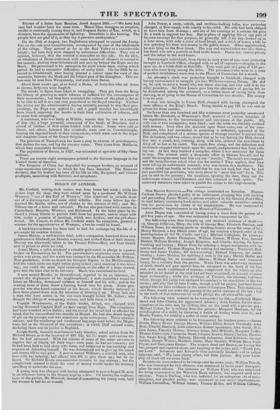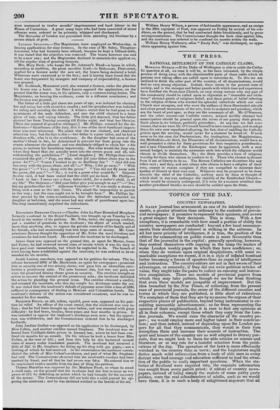OLD BAILEY SESSIONS.—The sittings terminated on Saturday. Thomas Cosham Brown
pleaded guilty to an indictment, charging him with inciting
and persuading James Woods, a person employed in the General Post Office, to steal letters, containing bank-notes, and other valuable securities, coming into his possession by virtue of his employment. He was sentenced to twelve months' imprisonment in the House of Correction.
Anne Magee was convicted of having stolen a frock from the person of a girl five years of age. She was sentenced to be transported for life.
The following were then brought up and received sentence of death :- viz. George Jefferson, Mary, the wife of George Roy, Elizabeth Pattison, and William Jones, for stealing goods in dwelling-houses above the value of 5/. ; Henry Burgess, a boy fifteen years of age, for uttering a forged order at the banking-house of Sir W. Curtis and Co.; Michael Callaghan, for coining ; James Harper, James Thompson, William Farrow, William Cox, Samuel Helder, William Rowley, Joseph Kingston, and Charles Styring, for hou-e- breaking and larceny; Petier Fenu for uttering a forged acceptance with in- tent to defraud ; Thomas Higgins, for cutting and maiming ; Frederick Hol-
loway and James Collins, for horse-stealing ; Samuel Simpson, for cattle- stealing ; James Maiden, for stabbing a man in the eye ,.,.Martin Mellet and
James Farthing, for an unnatural offence ; William Butler and Jeremiah Leary, for a robbery from the person. When Fenn was asked why sentence of death should not pass against him, he advanced to the front of the bar, and, with much confidence of manner, complained that the witnesses who
attended in his behalf at the trial had not been examined, on account of Mac legal technicality ; while the evidence of Vincent, the attorney, had been
taken, though the judge bad declared his conduct to be scandalous in the ex- treme ; and also that of John Cooke, though a bill for perjury had been found against him for false evidence in the court of Common Pleas. This statement, said Fenn, would not avert the passing of the awful sentence of the law ; but to the truth of that statement lie would pledge the salvation of his soul.
The following were ordered to be transported for life :—Frederick Ham- mond and John Clarke, for, aggravated felonies; John Costen, for the man-
slaughter of his own sun, by striking him on the head with a pewter pot ; Michael Cohen, for a robbery from the person ; Margaret Hartigan, for the manslaughter of a child, by throwing a kettle of boiling water over it; and Martha Turner, for robbing a sailor of some money.
The following were ordered to be transported for fourteen years :—James Green, Henry Evans, George Harris, William Elliot, Robert Threlkald, .101:n Rutt, Charles Staniard, John otherwise Robert Speakman, John Smith, 'W.,
liam Jones, Timothy Malony, Thomas Jones, John M`Gratli, Margaret Coffin; Thomas Cartwright, Catherine Steel, Johanna Brown, Henry Clayton, Thomas
Joy, Susan King, Mary Mahony, Hannah Solomons, Jane Edwards, George Jordan, Joseph Waters, Matthew Dunn, Mary Stewart, William Ross, Isaac Fryatt, and Georgiana Baxter. The women Steel and Brown, on leasing the bar, jumped and capered about, and laughing at the judge, said, "Thank you, my Lord." Solomous and Edwards were extremely insolent, and in vulgar language said, "We have plenty of law, but little justice. May your Lord- ship sit there till we come back."
Seventy-six were ordered to be transported for seven years. William Towell,
who was convicted for two offences, was sentenced to seven years' transport- ation for each offence. The sentence on William Vyse, who was convicted for being concerned in the Warwick Bank robbery, was respited until next sessions. Francis Darling, who was indicted for an outrageous act of man- slaughter, and pleaded guilty, was sentenced to two years' imprisonment. William Calmadiue, William Adams, Thomas Bellas, and William Coltuey,
were sentenced to twelve months' imprisonment and hard labour in the House of Correction. A great many boys who had been convicted of minor offences were ordered to be privately whipped and discharged.
The Recorder of London was prevented from attending the Sessions by a severe attack of gout.
LONDON SESSIONS.—The Magistrates were employed on Wednesday, in hearing applications for nine licences. In the case of Mr. Seley, Throgmor-
ton-street, who had formerly been refused, because he kept a billiard-table, it was stated that the objection was removed. The house however was said to be a new one; and the Magistrates declined to entertain the applicat on, till the regular time of granting licences. Mrs. Mary Bush, who keeps the Dr. Johnson's Head-La house in which, according to tradition, the great moralist lived—in Bolt-court, Fleet-street,
applied for a licence under the new act, the house being declared a hotel. Witnesses were examined as to the fact ; and it having been found that the house was frequented by strangers and company of respectability, a licence was granted.
Mr. Norbrook, Monument-yard, also wanted a licence, under the plea that his house was a hotel. Sir Peter Laurie opposed the application, on the ground that the house was, in his opinion, only a common eating-house. The Magistrates, on hearing the evidence, came to a different conclusion ; and the licence was granted.
The father of a little girl about ten years of age, was indicted for chaining her and using her with excessive cruelty ; and her grandmother was indicted for aiding and assisting the father. A witness stated that he had gone to the apartments of the male defendant, and saw the child chained to a large piece of iron, and crying bitterly. The little girl deposed, that her father chained her from Tuesday morning till Friday night, and beat her likewise. [Here she seemed disposed to whimper.] Mr. Phillips, counsel for the de- fends nts—" Gentlemen of the Jury, this is one of the most barefaced imposi- tions you ever witnessed. We admit that she was chained, and chastised otherwise too; but the fact is this :—her father is a poor tailor, and he had a drunken wife, who is in the workhouse. As the daughter had some of the mother's blood in her, he determined to prevent her from going into the streets whenever she pleased, and was absolutely obliged to chain her o his goose, to restrain her hereditary impetuosity. But what would the Jury say,
when they found that she actually went into the streets goose and all, not- withstanding the prohibition ?" [Loud laughter.] Mr. Phillips then cross- examined the girl—" Pray, my dear, what did your father chain you to the
goose for "—" 'Cause I wanted to go to Bartlemy fair." " And did you run away with the goose, chain, and all."—" Why, I did go away." " With the goose ?"—" Yes ; along with the goose." "You did not fly away with the goose, did you ?"—" No ; it want a goose what would fly." Serjeant Arabin said, it had been stated that the child got no food. Mr. Phillips- " Look at her : I never saw a finer, fatter child, for a tailor's child, in all my liffi." The Serjeant—" Did your father give you enough to eat ?"—" No; but my grandmother did." Alderman Venables—" It was really a shame to bring such a case as this into Court. We admit the impropriety to punish in this way ; but the case ought not to be brought here." Mr. Phillips fur- ther proved by the cross-examination, that the defendant unchained his daughter at bed-time, and she never had any mark of punishment upon her. The Jury immediately acquitted the defendants.
INSOLVENT DEBTORS COURT.—Charles John Le Poer Beresford Morphew formerly a colonel in the Royal Fusileers, was brought up on Tuesday to be heard in the matter of his petition. Mr. Tribe, tailor, the opposing creditor, put a number of questions to the insolvent ; the object of which tended, more than anything else, to expose the private concerns of his family and of his friends, who had occasionally lent him large sums of money. Mr. Com- missioner Bowen thought the opposition of Mr. Tribe the most frivolous and vexatious he had ever heard. He ordered the insolvent to be discharged.
James Gent was opposed on the ground that, as agent for Messrs. Jones and Foster, he had received several sums of money which it was his duty to have paid over immediately, but which he neglected to do. The breach of bust having been established against the insolvent, he was ordered to be re- manded for six months.
Josiah Laxton, merchant, was opposed on his petition for release. The in. solvent borrowed 2001. of Mr. Mackenzie, an agent for newspapers ; promised him as security one of two mining shares, and gave him as immediate satis- faction a promissory note. The note became due, but was not paid, nor were the promised mining shares given as security. The creditor brought an action to recover the amount of the promissory note; the insolvent defended the action by pleading the general issue. The creditor obtained a verdict, and arrested the insolvent, who this day sought his discharge under the act. It was stated that the insolvent's default of payment arose from a loss of 5004 suffered in consequence of dealing in Mexican and Colombian bonds. The insolvent's defence of the action was considered vexatious, and he was re- manded for five months.
Benjamin Brown, an old, infirm, squalid, poor man, appeared on his peti- tion for relief. An officer of the court stated, that the insolvent was very in- firm ; that he had been brought up once before, and was removed with great difficulty: he had been, besides, three years and four months in prison. It was intended to oppose the insolvent's discharge even now ; but the opposi- tion was withdrawn, and the Commissioner ordered him to be discharged forthwith.
John Jardine Gullen was opposed on his application to be discharged, by Miss Cohen, and another creditor named Stephens. The insolvent was re- leased from Coldbath-fields prison in January last, where lie had been con- fined six months for an assault. On his release he took a house from Miss Cohen, at the rent of 554; and from this lady he also borrowed several sums of money under fraudulent pretexts. The insolvent had incurred a debt of 324 to Mr. Stephens for fitting up his shop with gas pipes,--not a farthing of which he had received. In his examination the insolvent contra- dicted the whole of Miss Cohen's evidence, and part of what Mr. Stephens had said. The Commissioner observed that the insolvent's conduct had been marked by fraud, and all that he had sworn was false. He ordered him to be imprisoned twelve months from the date of filing his petition.
Thomas Macellan was opposed by Mr. Matthew Frost. to whom he owed a small sum, on the ground that the insolvent had led him to incur an ex- pense of 371. by defending an action which lie had brought for the recovery of the money. The Commissioner did not hold this a valid ground for op- posing the insolvent; and he was declared entitled to the benefit of the act, William Henry Wilson, a person of fashionable appearance, and an ensign in the 39th regiment of Foot, was opposed on Friday by several of his cre- ditors, on the ground, that he had contracted debts fraudulently, and by gross misrepresentations. The Commissioner thought the facts clear against him, and the insolvent was ordered to be confined six months within the walls.
William Henry Walbourn, alias " Dusty Bob," was discharged, no oppo- sition appearing against him.



















 Previous page
Previous page